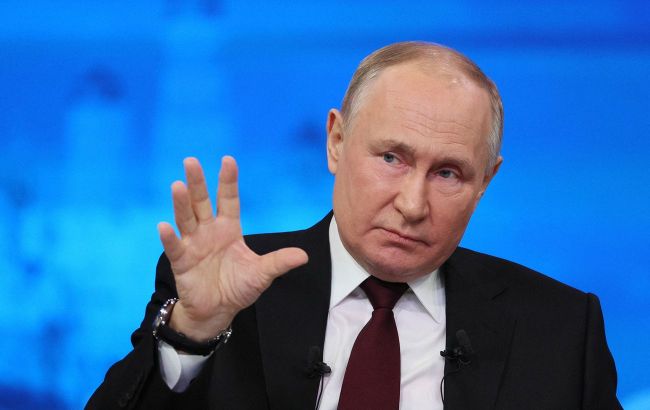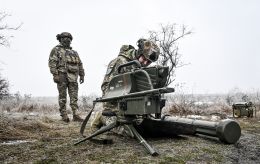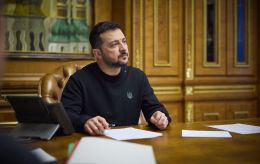Kremlin uses Istanbul agreement to facilitate invasion - ISW analysis
 Russian President Vladimir Putin (photo: Getty Images)
Russian President Vladimir Putin (photo: Getty Images)
The Kremlin is insisting on the 2022 Istanbul format for negotiations as a way to buy time and blame Kyiv for the stalling of current peace talks, while planning to repeat an invasion under more favorable conditions in the future, according to a report by the US-based Institute for the Study of War (ISW).
Experts believe that Moscow insists on using the 2022 Istanbul negotiation framework as the basis for current talks aimed at ending the war because Russia and its allies are seeking to preserve the right to veto any Western military assistance to Ukraine and to render the country neutral and defenseless against potential future invasions.
Russian Foreign Minister Sergey Lavrov, during a joint press conference with Indian Foreign Minister Subrahmanyam Jaishankar on August 21, stated that Russia would approach the issue of security guarantees for Ukraine based on its experience with the 2015 Minsk II agreement and the 2022 Istanbul negotiations.
Lavrov claimed that the 2022 Istanbul negotiations were based on the concept of addressing the root causes of the war in Ukraine, referring to a frequently repeated Kremlin assertion that the root causes of the war are NATO’s eastward expansion and the alleged discrimination against Russian-speaking populations and the Moscow Patriarchate-aligned Ukrainian Orthodox Church.
The Russian foreign minister stated that the 2022 Istanbul talks were intended to ensure Ukraine’s security fairly and collectively through a group of guarantor countries, which were to include the permanent members of the UN Security Council, Germany, and Türkiye.
On August 20, during a meeting with Jordanian officials, Lavrov also noted that Russia was ready to sign an agreement based on the 2022 Istanbul negotiations and described these talks as a good example of how to reach an accord to end the war.
Delaying negotiations and lobbying for a convenient invasion
The ISW believes that Lavrov’s recent statements praising the 2022 Istanbul negotiations indicate that the Kremlin has designated its foreign minister as the main conveyor of the long-standing Russian narrative that the Istanbul talks are a necessary starting point for current peace agreements.
Experts argue that an agreement based on the 2022 Istanbul negotiations would have paralyzed Ukraine, as it would permanently prohibit its NATO membership, impose draconian restrictions on the size of the Ukrainian Armed Forces, and forbid any military assistance from Western countries.
The draft agreement also stipulated that Russia and the UN Security Council, including China (a key Moscow ally), would receive the status of guarantor states, and that these guarantor states would act in coordination in case of any violation. This would have allowed Russia to veto Western military aid to Ukraine.
At the same time, the ISW noted that the Istanbul agreement draft imposed no restrictions on Russia’s military capabilities. This effectively neutralizes Ukraine’s political and military potential while preserving the Russian army’s ability to launch future invasions under far more favorable conditions than in 2022.
“The Kremlin likely understands that the 2022 Istanbul framework is a non-starter for Kyiv and therefore continues to invoke it in an effort to paint Ukraine as unwilling to negotiate while Moscow continues to delay good-faith peacemaking efforts,” analysts at the Institute for the Study of War concluded.
2022 Istanbul negotiations
After the start of the full-scale aggression, Ukraine and Russia held several rounds of negotiations. Initially, these took place in Belarus and later in Istanbul, but the parties were unable to reach any substantive agreement.
Moscow claims that a draft of the so-called Istanbul Agreement was allegedly prepared following these meetings. However, President Volodymyr Zelenskyy stated that no Istanbul Agreements ever existed and emphasized that the Kremlin’s goal was to secure the de facto capitulation of Ukraine.
According to the 2022 draft peace treaty, Ukraine would have had to forgo NATO membership, reduce the size of its armed forces to 85,000 personnel, and significantly decrease its arsenal of equipment and weaponry.
A separate clause stipulated that Crimea would remain under Russian control, and the issue of the Donbas region, occupied since 2014, would be discussed directly between Putin and Zelenskyy.
Ukraine proposed formal security guarantees in the event of a new attack, including control of its airspace and military support from the West. However, Russia rejected these conditions.
In May 2025, the Kremlin announced its readiness to resume negotiations with Kyiv based on the 2022 positions and the on-the-ground situation, taking into account the occupation of Ukrainian territories.

